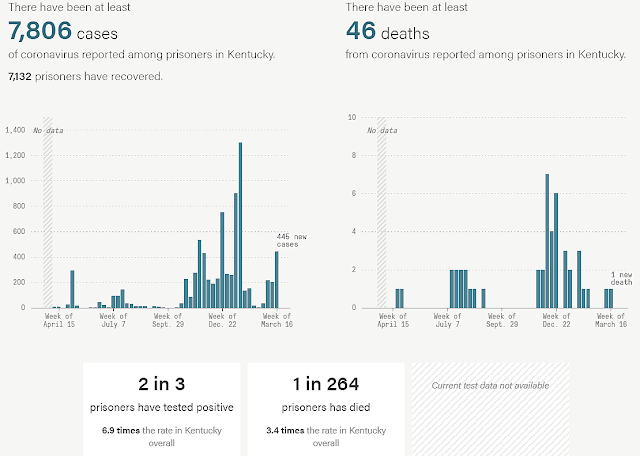Beshear blames high Covid-19 case numbers in prisons on testing, but death rate among state prisoners is third in U.S.

Marshall Project chart shows virus cases and deaths in state prisons. To enlarge, click on it.
—–
By Al Cross and Bruce Maples
The department reports 496 active cases among inmates and 35 among staff at its prisons, 470 and 22 at the penitentiary and 18 and 8 at the other Lyon County prison. Those numbers have declined in the last few days, but the county still has the nation’s highest seven-day rate of new cases, as it has for more than a week, according to The New York Times.
 |
| State Dept. for Public Health graph, relabeled by Ky. Health News; to enlarge, click on it. |
The state reported 294 new cases, 102 fewer than last Monday. That lowered the state’s seven-day average of cases to 650, down 15 from Sunday.
The governor said the state’s vaccination programs continue to hit his goal of using at least 90% of the weekly vaccine doses sent to the state, with the latest rate being 93.7%. To date, 1,186,538 Kentuckians have had at least their first shot. Beshear noted that the priority list expanded Monday to cover anyone over 50 and persons with intellectual or developmental disabilities.
Beshear said that for long-term-care facilities, “The vaccine has changed everything.” He shared a video from Lexington’s Sayre Christian Village showing vaccinated family members visiting with loved ones in person. The video closed with a resident looking into the camera and saying “If you haven’t got the shot, please do. It’s important — especially for older people.”
The state added 61 more deaths to its list of Covid-19 fatalities, including 50 from the ongoing audit of death certificates going back to October, bringing its toll to 5,799. Beshear said the good news was that none of the regularly reported and listed deaths occurred this month.
The 11 fatalities were a Carter County woman, 91; a Crittenden County man, 81; two Franklin County men, 67 and 84; a Fulton County woman, 88; a Harrison County man, 82; a Hickman County man, 87; a Kenton County woman, 79; a Letcher County woman, 85; a Marshall County woman, 91; and a Perry County woman, 89.
Kentucky hospitals reported 434 Covid-19 patients, the fewest since August. Of those, 95 were in intensive-care units, and 63, or almost two thirds, were on ventilators. The share of ICU patients who are mechanically ventilated is the highest since Kentucky Health News began tracking it five months ago.
Only one of the state’s 10 hospital regions, Lake Cumberland, had more than 80% of its ICU beds in use, and few of that 84% were Covid patients.
In other pandemic news Monday:
- Because too few people are signing up for vaccinations in Lexington, the local health department has made them available to anyone over 18, the department announced. Spokesman Kevin Hall “attributes the waning demand to the state’s influx of immunization sites, many of which have come online this month,” the Lexington Herald-Leader reports.
- Beshear said the state is concerned about possible spread of the virus from spring-break revelry in Florida. “If you’re not going to be careful, don’t send your kid back [to school] right away,” but use remote schooling, he said.
- Agriculture Commissioner Ryan Quarles announced that he is vaccinated. Quarles, a Republican who is expected to run for governor in 2023, had turned down an offer of the vaccine from Beshear (who says he wants Republicans to set an example), saying he would get a shot when it was his turn. Quarles, 37, said in a press release, “With food and agriculture being included in the industry groups in Phase 1C, I took the vaccine this weekend. While taking the vaccine is a personal choice, I encourage Kentuckians to take it when their place in line comes.”
- Southwest Virginia “has some of the highest coronavirus vaccination rates in the state, despite national surveys showing rural Republicans are the most reluctant to receive it,” The Washington Post reports. “The area’s robust public health infrastructure, which for years has delivered typical flu vaccines in mass settings, is part of the reason. So was the wake-up call that followed Thanksgiving — a post-holiday surge in cases so high that two hospitals brought in refrigerated trucks because their morgues were overflowing.” The story notes that the region is “geographically and culturally closer to Kentucky and Tennessee than to Virginia’s power centers
in Richmond and suburban Washington.” - AstraZeneca’s vaccine is 79% effective against symptomatic disease and 100% effective against severe disease and hospitalization, CNN reports. The company plans to apply for emergency-use authorization in the first half of April. UPDATE, 3/23: The National Institute of Allergy and Infectious Diseases, headed by Dr. Anthony Fauci, said early Tuesday that the firm may have left out a week of unfavorable data. “Scientists are describing the reaction as unusual and unprecedented for the agency,” The Washington Post reports.